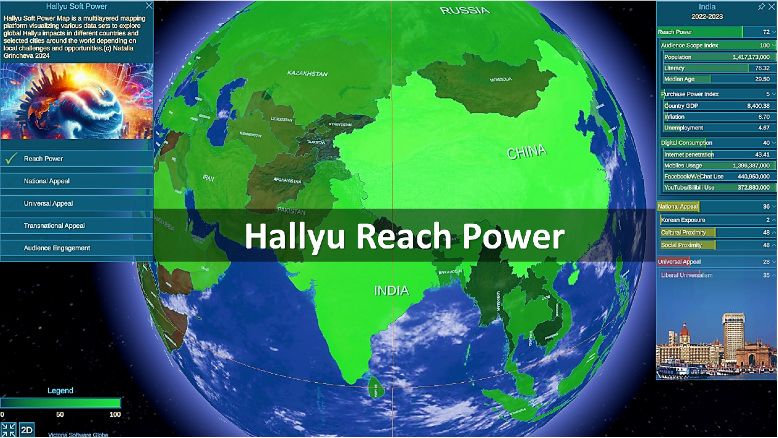
Author: Dr. Natalia Grincheva
Published: 5th July 2024
In the realm of digital connectivity, South Korea has long been a frontrunner. With top rankings in internet speed, smartphone ownership, and social media usage, the country has set global benchmarks. However, as noted by Robertson in 2017, South Korea lagged behind its competitors in digital diplomacy. Fast forward to 2024, and the landscape has dramatically shifted.
The Korean Wave, or Hallyu, has become a cultural phenomenon, riding the wave of digital economy and hyperconnectivity. With a global fanbase of 200 million and cultural exports reaching a staggering US $14 billion in 2024, Hallyu has become a formidable soft power tool for South Korea.
Recognising the potential of this cultural export, the South Korean government has made significant strides in enhancing its digital capabilities. The nation has pioneered the design of a country-wide metaverse, investing 227 billion won to nurture 40,000 professionals and 220 companies. The recent launch of Seoul Digital Twin, enabling citizens to access public services virtually, further underscores this commitment to digital innovation.
However, a critical question remains: is the South Korean government effectively leveraging Artificial Intelligence (AI) to assess its public diplomacy efforts, particularly in light of Hallyu's growing influence and the emergence of anti-Hallyu movements in various countries?
The application of AI in diplomacy is a hot topic in academic and professional circles. Its potential uses range from analysing social media and understanding public opinion to identifying threats through diverse data sources and assisting with negotiations. Of particular interest is AI's capacity to formulate policies based on real-time data analysis.
AI-powered systems excel at processing vast amounts of data, from satellite imagery and news reports to social media trends and economic statistics. By identifying patterns invisible to the human eye, AI can provide diplomats with invaluable decision-support tools. These systems can effectively visualise and interpret descriptive, diagnostic, predictive, and prescriptive analytics, offering a comprehensive view of current situations, dominant narratives, future trends, and potential courses of action.
The South Korean government is taking this potential seriously, creating the necessary infrastructure to leverage AI tools for Hallyu research and policymaking. Various agencies under the Ministry of Culture, Sport and Tourism and the Ministry of Foreign Affairs are investing significant resources in developing new tools and approaches to explore Hallyu's global impact.
The Korean Foundation for International Cultural Exchange (KOFICE) has commissioned several projects aimed at developing a big data platform to monitor, assess, and predict Hallyu's spread and impact worldwide. Their K-Wave Big Data platform, designed by Social Intelligence Lab Ars Praxia, uses AI to parse social media for real-time sentiment analysis across different regions, focusing on K-pop, K-movies, and K-drama.
Similarly, the Korea Culture Information Service Agency (KCISA) has developed a Culture Big Data platform. This system aggregates data from 32 Korean cultural centres in 27 countries to facilitate real-time decision-making regarding Hallyu. KCISA is also working on a Hallyu dictionary project, exploring the linguistic environment of Hallyu circulation to understand how people describe their experiences with Korean culture.
In the private sector, companies like Space Oddity are collecting and analysing big data to provide consultancy services to entertainment industries. Their K-pop Radar serves as a fandom data observatory, monitoring social media trends on K-pop's global popularity.
The Korean Foundation, under the Ministry of Foreign Affairs, is also contributing to this data-driven approach. Their Policy-Oriented Research Grant Program funded a large-scale international project on Mapping Global Impacts of Hallyu in 2024. This project aims to explore the Korean Wave as a complex global phenomenon, employing data-driven and machine learning approaches alongside traditional qualitative research.
A key tool in this research is the Data To Power geo-visualisation application. This dynamic mapping software allows for the measurement, mapping, and prediction of soft power impacts on a global scale. By integrating different types of data through cartographic display on multiple layers, Data To Power offers a reliable tool for visualising distributed data values across different countries or geographic areas.
The Hallyu Soft Power map, still in development and set to be completed by the end of 2024, invites audiences to explore several layers of soft power assessment. It focuses on Hallyu's potential penetration in different countries and deconstructs its attraction power, exploring the degree to which Korean cultural products generate national, transnational, and universal appeal in particular countries.
As South Korea continues to harness the power of AI and big data in its public diplomacy efforts, it sets a new standard for cultural soft power evaluation. The integration of these technologies not only allows for more accurate assessment of Hallyu's impact but also provides valuable insights for policymaking and cultural promotion strategies.
The journey of South Korea from digital connectivity leader to digital diplomacy innovator serves as a fascinating case study in the evolving landscape of international relations. As Hallyu continues to sweep across the globe, the tools and methodologies developed by South Korea to measure and leverage its impact may well become models for other nations seeking to enhance their cultural soft power in the digital age.